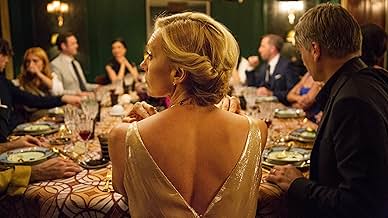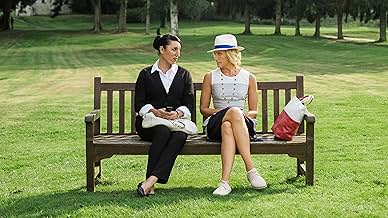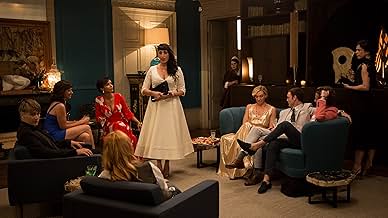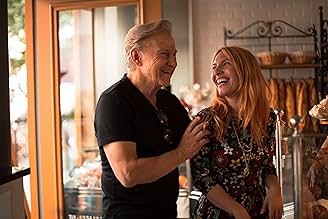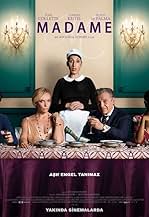Madame
- 2017
- Tous publics
- 1h 31min
NOTE IMDb
6,1/10
9 k
MA NOTE
Pour éviter d'être treize lors d'un grand dîner, un couple d'américains fortunés vivant à Paris demandent à Maria, leur domestique, de se faire passer pour une riche amie espagnole. Mais l'u... Tout lirePour éviter d'être treize lors d'un grand dîner, un couple d'américains fortunés vivant à Paris demandent à Maria, leur domestique, de se faire passer pour une riche amie espagnole. Mais l'un des invités tombe sous le charme de Maria.Pour éviter d'être treize lors d'un grand dîner, un couple d'américains fortunés vivant à Paris demandent à Maria, leur domestique, de se faire passer pour une riche amie espagnole. Mais l'un des invités tombe sous le charme de Maria.
- Réalisation
- Scénario
- Casting principal
Avis à la une
Infidelity, lies, and 'putting on appearances' is at the centre of this film. No one is who they appear to be. A woman craves for attention, another lets her husband have an affair to confirm his dedication to her. An older man seeks solace without pressure. What we can first perceive as a true love soon manifests into one of shallow fancy, carried by whim and ended with a truth.If you want to see a stereotypical love affair with cute tied up with a ribbon ending, do not watch this film, If you are open to the reality of life, then this is one for you.
I feel that 'Madame' needs a few words spoken in its defence.
Trying to keep this as spoiler-free as possible, this is a lovely, bitter-sweet little dramedy, unusual in its ending. And this latter element is precisely what is charming about it. It is not just another Disney-like, implausible, 'Cinderella' story of the type Hollywood throws up at us with admirable frequency. Though by far not a masterpiece, and in search of a character, being not quite a drama, nor quite a comedy, the ending makes it stand out.
In my view, the ending is perfect precisely because it is more realistic, it feels more real. Characters who live in a false world (keeping thin by forcefully throwing up, or organising luxurious parties while being on the verge of bankruptcy) remain in their false world, continuing to suffer in their gilded cages. Is that not the perfect punishment? People who were always dignified, who had self-respect and a certain untouched morality, retain their dignity, their esteem, in their own eyes, and in the eyes of the audience. Is that not an effective ending? It is not necessary to always have the same reversal of roles, easily served, and so easily digested, dispensed with, and forgotten.
Every time a script goes outside the usual, overused Hollywood trope, audiences start to bitch and moan at how awful this is, how unsatisfied they are. I have a strong feeling, that if it had the ending everyone is so anxious for, these same people would say: 'Well, where's the novelty in that? We've seen that before'.
Haven't we seen enough 'Maids in Manhattan'? Do we really need yet another fairly empty romance story with the usual players - the low-born or low-placed but (always!) beautiful girl, the quirky, but ridiculous best friend, the rich and powerful stud who crosses the social divide for love? Such films are sweet, but outside their very narrow romantic premise, sweet as that may be, they say very little either about society, or about the people in it, their character, their self-perception, their understanding of the world around them. 'Madame' has something to say about these things. It says it with much less panache than 'Remains of the Day', but it is closer to the real world of today than other romantic comedies.
No, I do not consider 'Madame' a masterpiece. Nor do I feel it wants to be such. If its aims are modest, they are still interesting and valid, and if the satire and social commentary are modest, this does not make them necessarily less effective, or less intelligent.
Perhaps giving it a 7 is too generous (or, depending on ones perspective and understanding, not generous enough). Yet I feel the ending does merit recognition, and if I gave the rest a six, the ending pulls in a star on its own.
Trying to keep this as spoiler-free as possible, this is a lovely, bitter-sweet little dramedy, unusual in its ending. And this latter element is precisely what is charming about it. It is not just another Disney-like, implausible, 'Cinderella' story of the type Hollywood throws up at us with admirable frequency. Though by far not a masterpiece, and in search of a character, being not quite a drama, nor quite a comedy, the ending makes it stand out.
In my view, the ending is perfect precisely because it is more realistic, it feels more real. Characters who live in a false world (keeping thin by forcefully throwing up, or organising luxurious parties while being on the verge of bankruptcy) remain in their false world, continuing to suffer in their gilded cages. Is that not the perfect punishment? People who were always dignified, who had self-respect and a certain untouched morality, retain their dignity, their esteem, in their own eyes, and in the eyes of the audience. Is that not an effective ending? It is not necessary to always have the same reversal of roles, easily served, and so easily digested, dispensed with, and forgotten.
Every time a script goes outside the usual, overused Hollywood trope, audiences start to bitch and moan at how awful this is, how unsatisfied they are. I have a strong feeling, that if it had the ending everyone is so anxious for, these same people would say: 'Well, where's the novelty in that? We've seen that before'.
Haven't we seen enough 'Maids in Manhattan'? Do we really need yet another fairly empty romance story with the usual players - the low-born or low-placed but (always!) beautiful girl, the quirky, but ridiculous best friend, the rich and powerful stud who crosses the social divide for love? Such films are sweet, but outside their very narrow romantic premise, sweet as that may be, they say very little either about society, or about the people in it, their character, their self-perception, their understanding of the world around them. 'Madame' has something to say about these things. It says it with much less panache than 'Remains of the Day', but it is closer to the real world of today than other romantic comedies.
No, I do not consider 'Madame' a masterpiece. Nor do I feel it wants to be such. If its aims are modest, they are still interesting and valid, and if the satire and social commentary are modest, this does not make them necessarily less effective, or less intelligent.
Perhaps giving it a 7 is too generous (or, depending on ones perspective and understanding, not generous enough). Yet I feel the ending does merit recognition, and if I gave the rest a six, the ending pulls in a star on its own.
Well I am annoyed. Just watched the movie, and what was a pretty good film had a really crappy ending. Toni is a real hypocrite and total bitch in the movie, you really want her utter snobbery to be her undoing. Problem with trying to make a movie like French Cinema, is that it is unsatisfying for an American audience. The ending is plain bad. I gave the movie a 6/10, that seems fair to me, since it goes nowhere and the ending is just not good. Really annoys me to see a good movie end so badly. Worth watching for Harvey Keitel, but I totally hated the character Toni Collete is playing, she is without mercy and an utter snob. Ironic that she claims to be a Democrat in the movie. The Director should have delivered a better ending. Can't believe that's it.
I started it because I love almost everything that Toni Colette does, and Harvey Keitel is also usually worth seeing. But in this movie, Rossy de Palma steals it (not to imply that Colette disappoints). Only an '8' because it's overly brilliant in any single regard (cinematography or dialogue or directing or whatever). But it is definitely more than adequate in every aspect. de Palma is fascinating to watch, and you really - unlike in so many other movies -do want to find out how it ends.
The comedy of manners genre uses satire to expose the rituals and affectations that pass for social politeness. Driven by witty dialogue and characterisation, it laughs at the best and worst in human behaviour. A good example is the comedy drama Madame (2017) that blends themes of race and class in a charming Cinderella tale of self-discovery.
The plot line is deceptively straightforward. Pretentious American couple Anne (Toni Collette) and Bob (Harvey Keitel) have rented an elegant manor in trendy Paris to impress their friends and clients. On the eve of a 'spare-no-expense' formal dinner a guest cancels, leaving the dinner table with an odd number of guests. Anne instructs her shy servant Maria (Rossy de Palma) to make up the number, pretend to be a Spanish lady friend, and say very little. After a few drinks, Maria becomes outgoing and is noticed by British art broker David (Michael Smiley) who is convinced she is a mysterious aristocrat. To Anne's horror they begin seeing each other despite desperate attempts to stop them.
Woven into this simple plot is a portrait of a lowly maid hoping to be loved for who she is, not what she does. Her nemesis is Anne, the wicked witch who wants to keep her in place. While Keitel and Smiley competently fill their supporting roles, the emotional energy comes entirely from the two female stars. Collette portrays scandalised with consummate bitchery as she engineers what she calls a 'slow-motion car crash' and de Palma does a heart-warming rendition of the maid who dares to hope. Brilliantly filmed in Parisian locations, its narrative twists and turns play on themes of class ritual and racial stereotype. The script is at times laboured with trite references to knowing one's place, but it is de Palma who keeps the story alive. She uses those big innocent eyes to convey how it feels to suddenly believe that someone really loves you, all while being oblivious to the masquerade into which she has been thrust. De Palma's unconventional aesthetics become a device to highlight the deeper values of kind-hearted character and the superficiality of skin-deep beauty.
This slow-burning comedy is a study of inflated egos and natural humility. Its minimal plot allows the focus to stay on the battle between primal feminine drives, one stopping at nothing to preserve the social order, the other swept up in a Cinderella dream. Not all fairy tales have conclusive endings and nor does this one. But it has enough laughter and warm-hearted moments to be worth watching despite its BYO ending.
The plot line is deceptively straightforward. Pretentious American couple Anne (Toni Collette) and Bob (Harvey Keitel) have rented an elegant manor in trendy Paris to impress their friends and clients. On the eve of a 'spare-no-expense' formal dinner a guest cancels, leaving the dinner table with an odd number of guests. Anne instructs her shy servant Maria (Rossy de Palma) to make up the number, pretend to be a Spanish lady friend, and say very little. After a few drinks, Maria becomes outgoing and is noticed by British art broker David (Michael Smiley) who is convinced she is a mysterious aristocrat. To Anne's horror they begin seeing each other despite desperate attempts to stop them.
Woven into this simple plot is a portrait of a lowly maid hoping to be loved for who she is, not what she does. Her nemesis is Anne, the wicked witch who wants to keep her in place. While Keitel and Smiley competently fill their supporting roles, the emotional energy comes entirely from the two female stars. Collette portrays scandalised with consummate bitchery as she engineers what she calls a 'slow-motion car crash' and de Palma does a heart-warming rendition of the maid who dares to hope. Brilliantly filmed in Parisian locations, its narrative twists and turns play on themes of class ritual and racial stereotype. The script is at times laboured with trite references to knowing one's place, but it is de Palma who keeps the story alive. She uses those big innocent eyes to convey how it feels to suddenly believe that someone really loves you, all while being oblivious to the masquerade into which she has been thrust. De Palma's unconventional aesthetics become a device to highlight the deeper values of kind-hearted character and the superficiality of skin-deep beauty.
This slow-burning comedy is a study of inflated egos and natural humility. Its minimal plot allows the focus to stay on the battle between primal feminine drives, one stopping at nothing to preserve the social order, the other swept up in a Cinderella dream. Not all fairy tales have conclusive endings and nor does this one. But it has enough laughter and warm-hearted moments to be worth watching despite its BYO ending.
Le saviez-vous
- AnecdotesAnne (Toni Collette) argues with Maria (Rossy de Palma) that many Spanish people became succcesful and mentions, among others, Pedro Almodóvar and Antonio Banderas. Rossy de Palma worked with Almodovar in at least 6 movies, including "Mujeres al borde de un ataque de Nervios" and "Ata-me" (in which Banderas is in too).
- ConnexionsReferences Love Actually (2003)
- Bandes originalesRock 'n' Dollars
Written & performed by William Sheller
Meilleurs choix
Connectez-vous pour évaluer et suivre la liste de favoris afin de recevoir des recommandations personnalisées
- How long is Madame?Alimenté par Alexa
Détails
- Date de sortie
- Pays d’origine
- Sites officiels
- Langues
- Aussi connu sous le nom de
- Мадам
- Lieux de tournage
- Paris, France(location)
- Sociétés de production
- Voir plus de crédits d'entreprise sur IMDbPro
Box-office
- Budget
- 4 000 000 € (estimé)
- Montant brut aux États-Unis et au Canada
- 90 979 $US
- Montant brut mondial
- 5 381 950 $US
- Durée1 heure 31 minutes
- Couleur
- Rapport de forme
- 2.35 : 1
Contribuer à cette page
Suggérer une modification ou ajouter du contenu manquant




